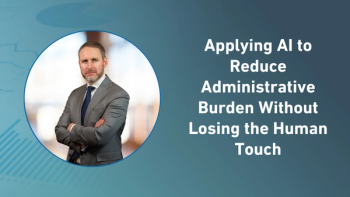
Are Clinical Trial Matching Services Truly Patient-Centric?
Finding the right clinical trial for yourself or others can be confusing and challenging. Matching services could provide potential relief, but only if aligned with both the physician and the patient.
If you have ever tried to find the right clinical trial for yourself or a loved one, you know the process can be confusing and challenging. For example, in the age of precision medicine, oncologists often offer multiple treatment options, from FDA approved indications to experimental therapeutics that are not yet on the market. Meanwhile, for sponsors, effective patient recruitment for clinical trials is critical to meeting timelines and budget goals.
Recognizing the need for alignment, several so-called clinical trial to patient matching services have emerged. Though well-intentioned, some of the current formats adopted by these service providers may inadvertently be introducing additional complexity into the lives of patients looking for life saving therapies. In order to properly utilize these services, patients obviously must first be aware of the availability of the service. Additionally, it is important for patients to understand if these services have a non-biased perspective, as there is obvious conflict of interest potential with matching services being provided by sponsors. Ultimately, selecting the right service (or even being aware of its existence) can be more formidable than working with your physician to find a clinical trial in the first place. How can that be the case? To understand this assertion, first we must explore the plethora of options available and how they operate.
Clinical Trial to Patient Matching Options
There are many different types of clinical trial matching services, but they all aim to connect the right patients with the right studies, aiding sites and promoting clinical research awareness.
For sake of clarity, these clinical trial matching services can be categorized as: services that require registration and auto-match patients to clinical trials, services that do not require registration and simply allow patients to browse online databases of clinical trials, and disease-specific services.
Registration-based services: Similar to a dating site, patients seeking a clinical trial enter key demographic and health information into an interface. Based on this information, the service matches each patient with the most suitable studies currently enrolling, providing basic study information, as well as, typically allowing communication with other patients.
An example of this kind of service is
Services that do not require registration: These services typically offer an easily searchable online database, allowing patients to search clinical trials that are recruiting patients and contact those that they are potentially interested in. Some of these kinds of “no registration required” services will allow you to contact them by phone, where a representative will speak with you about your condition and let you know about clinical trials that you may qualify for.
An example of this kind of service is
Disease-specific services: Some clinical trial matching services specialize in certain diseases and conditions. Most of these are hosted by patient-advocacy groups that play matchmaker - linking patients to researchers who need them for clinical trials. These services usually allow patients to connect with and be a part of a larger community of people who are all focused and motivated to find effective treatments for the same condition. HIV/AIDS groups in the 1980’s started the trend of patient communities focusing on trial recruitment and retention, and dozens of disease-specific groups have followed suit - breast cancer, autism, diabetes, asthma, etc.
An example of this kind of service is
Ongoing Challenges
The sheer number and diversity of clinical trial matching services has expanded rapidly in recent years, creating its own set of problems.
It used to be that the education and motivation required for patients to find the right clinical trial to participate in left many potential volunteers feeling overwhelmed. Organizations like the
- What is the purpose of the study?
- Who is sponsoring the study, and who has reviewed and approved it?
- What kinds of tests, medicines, surgery, or devices are involved? Are any procedures painful?
- What are the possible risks, side effects, and benefits of taking part in the study?
- How might this trial affect my daily life? Will I have to be in the hospital?
- How long will the trial last?
- Who will pay for the tests and treatments I receive?
- Will I be reimbursed for other expenses (for example, travel and child care)?
- Who will be in charge of my care?
- What will happen after the trial?
Now, organizations like the
- Is there a fee for using the service?
- Does the service keep my information confidential?
- Where does the service get its list of clinical trials?
- Does the service rank the studies in any particular order, and is the rank based on fees they receive?
The rise of various clinical trial matching services is certainly a step in the right direction towards making clinical trial participation an easier process for potential volunteers, but there is still work to be done to streamline the process for patients. The bottom line is that busy lifestyles and the frenetic pace of life effectively assures that clinical trial recruitment will only succeed when the process is made easy and hassle-free for the patient.
Key to Halting Declining Trial Enrollment?
Patient recruitment in clinical trials is an area of growing challenge and concern for the pharmaceutical industry. Several factors have contributed to declining enrollment rates - increasing volume of clinical trials conducted worldwide, increasing number of inclusion/exclusion criteria, the nature of modern medical practice (doctors lacking time, resources and staff to enroll patients), etc.
While these match-making solutions hold much promise for rectifying the problem of declining patient enrollment in clinical trials worldwide, the reality is that further centralization of the patient matching process needs to happen in order to facilitate an easy, smooth and efficient experience for potential trial volunteers. In other words, if clinical trial to patient matching services are going to play a role in reversing recruitment shortfalls, they need to be more patient-centric.
Taking a Lesson from Consumer Centric Services
Clearinghouses exist everywhere for aggregating data sources and serving the data up to the consumer at the right time in the right context. When you shop for rental cars, hotels, or flights, it is a one-stop shop experience across multiple vendors through platforms like Expedia, Travelocity, and others. Guidance is provided as to when to purchase and how to get the best deal, while ancillary services and offers are provided to simplify planning.
Could this consumer centric approach be applied to clinical trials? The notion of patient centricity is becoming a significant strategic focus across all sectors of healthcare. Defined as the process of designing a service or solution around the patient, patient centricity can also be thought of as meeting the patient needs at the right time in the right context. When you need a clinical trial, the relevant context typically involves your physician. Perhaps matching services could involve the physician, offering a view for both the provider and the patient? Such a design would ensure that the patient gets the information they need while the provider plays the role of examining protocols and medical terminology.
We need a clearinghouse of matching services, a Travelocity for clinical trials. Should the patient be on the front lines when choosing a clinical trial? Is that truly patient centric? The solution must involve technologies and data sources that are aligned to the patient and physician, offering tailored information and services that guide each party through the process and onto the best result for the patient. Now that would be patient-centric.
References
- How Do Clinical Trials Protect Participants? US Dept. of Health and Human Services, NIH Website. Available at:
http://www.nhlbi.nih.gov/studies/clinicaltrials/protect - How Do I Find a Clinical Trial That’s Right for Me? American Cancer Society, September 2016. Available at:
http://www.cancer.org/treatment/treatmentsandsideeffects/clinicaltrials/whatyouneedtoknowaboutclinicaltrials/clinical-trials-what-you-need-to-know-picking-a-clin-trial
Newsletter
Stay current in clinical research with Applied Clinical Trials, providing expert insights, regulatory updates, and practical strategies for successful clinical trial design and execution.




